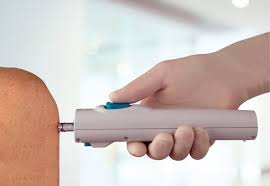20 August 2025 | Wednesday | News

-PharmaJet®, a company that strives to improve the performance and outcomes of injectables with its enabling needle-free injection technology, announced that the WHO prequalified Tropis ID delivery system will be used to support a polio eradication campaign sponsored by the National Emergency Operation Center (NEOC) Afghanistan, UNICEF, WHO, and other GPEI partners starting in August 2025. Focused on the Eastern region of Afghanistan, the campaign will deploy Tropis ID to administer 1.3 million fractional doses of inactivated polio vaccine (fIPV) to children ages 5 and under in parallel to oral polio vaccine (OPV) administration as part of a WHO-recommended strategy to boost humoral and mucosal immunity.
Poliovirus has been eliminated in most parts of the world due to widespread vaccination campaigns, but it continues to circulate in Afghanistan and Pakistan. In 2024, wild poliovirus type 1 (WPV1) transmission rose significantly in Afghanistan. The use of Tropis ID enables site-to-site immunization, a strategy where vaccination services are offered at multiple, convenient locations. This approach is expected to help increase immunization coverage, particularly in high-risk areas. The Technical Advisory Group (TAG) on polio eradication endorsed the Afghanistan program’s “Strategic Reset” to optimize site-to-site vaccination, while stressing the need for stronger leadership, community acceptance, and broad government engagement. Including Tropis ID fIPV in this immunization program supports Afghanistan’s polio eradication goals to eliminate persistent virus lineages in the East, prevent new WPV1 cases in the East and South Regions, and prevent local transmission in other parts of the country.1
“We are pleased to be partnering with UNICEF, WHO, and NEOC Afghanistan in their continued efforts to eradicate polio,” said Paul LaBarre, Senior Vice President Global Business Development, PharmaJet. “We aim to achieve high impact in the fight against poliovirus, including increased coverage, decreased costs, and high acceptability2 previously seen with Tropis ID delivered fIPV in Pakistan,2 Somalia,3 and Nigeria4.”
Refer to Instructions for Use to ensure safe injections and to review risks.
|
1 World Health Organization, Global Polio Eradication Initiative, Technical Advisory Group urges strong action to eradicate polio in Afghanistan, February 26, 2025 |
|
2 Daly, C et al, Needle-free injectors for mass administration of fractional dose inactivated poliovirus vaccine (fIPV) in Karachi, Pakistan: A survey of caregiver and vaccinator acceptability, Vaccine, Volume 38 Issue 8, 18 February, 2020, Pages 1893-1898 |
|
3 Nouh, K et al, Use of a fractional dose of inactivated polio vaccine (fIPV) to increase IPV coverage among children under 5 years of age in Somalia, Springer Nature Volume 2 article number 16 (2024) |
|
4 Biya, O et al, Notes from the Field: House-to-House Campaign Administration of Inactivated Poliovirus Vaccine — Sokoto State, Nigeria, November 2022, CDC Morbidity and Mortality Weekly report, November 24, 2023 / 72(47);1290–1291 |
|
5 Global Polio Eradication Initiative, who we are: https://polioeradication.org/who-we-are/ |
© 2026 Biopharma Boardroom. All Rights Reserved.